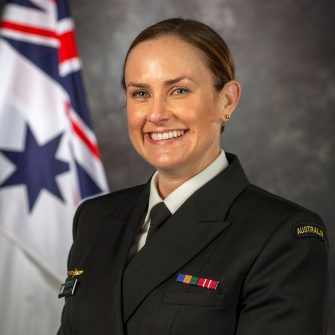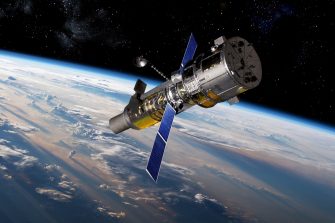
Penelope Twemlow
Senior Director for Ashurst Risk Advisory
Penelope Twemlow, a UNSW alumna with 23 years’ experience in the Royal Australian Navy, is a Senior Director for Ashurst Risk Advisory leading the Commonwealth Government and Defence sectors in Canberra. She is the Co-Founder and Chairperson of Women in Power – a not-for-profit organisation with a mission to promote and empower women, which in turn benefits industry and a board member of Women in Defence Association and DEFGLIS – the Defence Gay and Lesbian Information Service.
Having studied Nuclear Regulatory Law, Penelope is a member of Women in Nuclear Australia and the Australian Nuclear Association Inc. Penelope is an author and keynote speaker, and a passionate advocate for veterans, mental health, domestic violence and homelessness.
She continues to receive accolades for her vision and entrepreneurship, including being previously named the winner of the Queensland Telstra Business Women's Award for Social Enterprise and Not-For-Profit and winner of three separate categories in the national Women in Industry Awards. She has also been named APAC CEO of the Year, the winner of Canberra’s ‘Women of Spirit’ Award and was a finalist in the Women in Business Awards, the National Association of Women in Construction Awards, the Australian Institute of Management Leadership Awards and the Lord Mayors Business Awards.
Military background and education
Penelope joined the Royal Australian Navy in 2001 as Maritime Warfare Officer (MWO). She completed her initial junior officer training at HMAS CRESWELL prior to joining the Australian Defence Force Academy in 2002 where she graduated with a Bachelor of Arts in 2004. For the next two years, Penelope served as a MWO on various ships including MANOORA, WOLLONGONG and YARRA, which involved working up ships for deployment post the September 11 attacks.
In 2008, Penelope transferred her primary qualification from MWO to Naval Police Coxswain Officer (NPCO). Penelope subsequently completed police basic training and investigator training and graduated as a Naval Police Investigator, serving in both the Naval Investigative Service and the Australian Defence Force Investigative Service. As an NPCO, Penelope completed postings to HMAS KUTTABUL, PENGUIN, ALBATROSS and Joint Investigative Authorities in Randwick and Richmond. After having provided ten-and-a-half years of service, Penelope discharged from full-time service in 2011.
Since discharging from full-time service, Penelope has provided service as a Naval Reservist in various roles including Deputy Director ADF Values and Behaviours, Safety, Risk, Mental Health and Wellbeing Staff Officer, Family and Domestic Violence Project Officer, Special Projects Officer for the Royal Commission into Defence and Veteran Suicide, Gender Focal Point and Deputy Director Assurance for the Directorate of Naval Personnel Workforce Issues Management.
In addition to her UNSW degree, Penelope completed studies whilst serving in:
Master Project Management
Diploma of Business (Frontline Management)
Diploma of Government (Management)
Diploma of Quality (Auditing)
CERT IV in Training and Assessment
CERT IV in Occupational Health and Safety
OH&S and Quality Management Systems Lead Auditor.
Educational journey
Penelope outlined that in high school, she didn’t' really know what she wanted to do with her life, so she found something that looked like it could be interesting, educational and fun, and subsequently joined the Navy.
In the Navy, she learnt useful skills and abilities such as discipline, leadership, self-management, people management, accounting, computer skills, and more. The education she received, and continues to receive, from her time in uniform, is invaluable, and brings a dimension to her as a professional that others don’t have without a service background.
Towards the end of her ten years of service, Penelope began to hunger for what else was out there. So, whilst deployed, she used her time to ensure she was as prepared as possible for the civilian world. This time was spent training and studying for roles she aspired to.
Before discharging from the Forces, Penelope completed two Masters degrees in Business Administration and Project Management, as well as qualifications in auditing, quality and training and assessment, knowing that each of these skills were necessary for professional life, and management-related roles. She also made sure that she understudied senior management personnel, learning what she considered was positive and negative leadership traits that she could apply or discard on her future civilian employment journey.

Transition to civilian career
The pathway to civilian employment is different for every veteran so it is vital that one is prepared as much as possible.
Penelope outlined that her transition to a civilian career was difficult. She outlines that she applied for over 100 jobs and received rejection after rejection with many citing that 'she doesn’t have the experience required'. What Penelope subsequently found is that civilian employers do not understand the skills and experience of veterans, and how they can benefit the civilian workforce. This is why Penelope continues to work in the veteran arena to ensure transition and post-service activities are supportive for veterans.
Penelope provides the following tips for transitioning to a civilian career:
- Join and undertake activities within the various Defence Force Transition Programs including seminars, job search workshops, transition coaches, assistance for preparing for civilian employment, access to funding for training and professional advice and paid leave to participate in transition-related activities.
- Discuss having your ADF skills and training recognised and aligned with a national civilian qualification with the Australian Defence College.
- Prepare mentally for the change by talking to friends and family, connecting with groups set up by veterans or ex-service organisations, or seeking professional assistance services tailored for veterans.
Penelope rounds this advice out with one final point stating that, if you are struggling or you need help with issues relating to employment, relationships, past trauma, wellbeing, transition to civilian life and more, contact Open Arms – Veterans and Families Counselling, opens in a new window.
Personal reflection
Education of any kind is the most powerful weapon we can use to change the world.
Education is a critical investment in your future; if you have a thirst to know more, find out more! Take a course, read a book, search the internet, interview an expert, listen to podcasts and undertake work experience. Nothing you learn is wasted. Feed your inquiring mind.
To want to be successful is merely a desire. You cannot just want something or expect the universe to bring it to you, you have to actually go out and make it happen.
Advice to student veterans
From a student perspective, Penelope emphasizes the importance of utilising university resources such as academic advising, tutoring and counselling, and communicating with lecturers. She outlines that it is important to leverage your military skills (leadership, discipline and adaptability) whilst studying and to stay technologically proficient. Last, she states that student veterans must make time to reflect and adapt at the end of each semester so that successes and challenges can be recognised and overcome.
For those working whilst studying, Penelope emphasises the importance of prioritisation and time management in juggling a demanding career, extracurricular activities, and family life. "If you’re going to spend a minimum of eight hours a day at work, you must love what you do," she says. Penelope also highlights the significance of maintaining health through activities like marathons, triathlons, rowing and muay thai, as well as surrounding oneself with a supportive network or "tribe" of personal and professional advisors.
Learn more
Contact us
If you have any questions or general queries about our Veterans program, please get in touch: veterans@unsw.edu.au.

